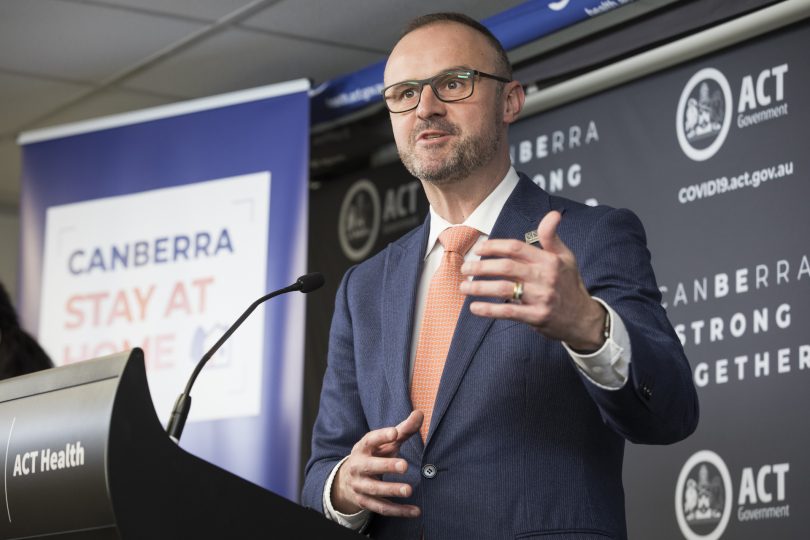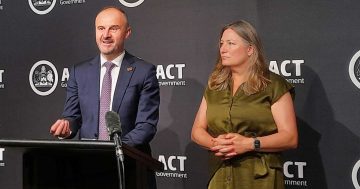
Canberra Liberals leader Alistair Coe has repeatedly said that lower rates and house prices will help grow Canberra’s economic pie. Photo: Region Media.
Around 230,000 people – more than 50 per cent of the current ACT population – would have to move to the Territory this financial year if the Canberra Liberals were to pay for their election promises using their ‘grow the pie’ model, according to ALP analysis.
At the current population projections, this population growth will be achieved just before 2050.
The Liberals have repeatedly said they would freeze rates but not cut any services, while also offering up more than $1 billion worth of election commitments.
These commitments are a combination of new expenditure and foregone revenue, but Chief Minister Andrew Barr has questioned where the money is coming from if the Liberals will not cut services.
The Liberals have avoided questions about borrowing more money – referring instead to “growing the pie”.
Opposition leader Alistair Coe has repeatedly claimed Canberrans are deserting the ACT in favour of cheaper housing in neighbouring Queanbeyan, Googong and Murrumbateman. He says the Liberals’ election commitments would be paid for by lowering the cost of living in Canberra and reducing house prices, enticing more people back to live in the ACT. This would then increase the ACT’s rates revenue.
Labor says the Liberals’ “economic pie” would need to increase by 115,000 households.
“The ACT currently has around 185,000 rate-paying households and a population of approximately 430,000 people,” Mr Barr said, adding that as of yesterday (23 September), the Liberals policy amounted to more than $1 billion of “unfunded election commitments”.
Broken down, these include:
- $175 million in foregone revenue from a four-year rates freeze
- $120 million for elective surgery (Health Minister Rachel Stephen-Smith said the policy would cost $180 million)
- $100 million in foregone revenue to cut car rego
- $100 million for 100 kilometres of bike paths (using Transport Minister Chris Steel’s $1 million per kilometre figure)
- $59 million for new buses, drivers and express routes
- $50 million on 2,500 green parking spaces
- $40 million local roads maintenance package
- $30 million for mental health beds and 55 new staff
- $25 million for sports centres in Gungahlin and Tuggeranong
- $16 million for non-government schools
- $15 million for school infrastructure
- $14 million on 50 new teacher-librarians
- $12.5 million for flashing school zone lights
- $7 million for a multicultural centre
- $7 million for GP bulk-billing incentives.
The Liberals have also pledged to plant one million trees over the next decade, but have not costed the policy. The Government estimates it costs $380 per tree which includes five years of watering, maintenance and planting. However, the Liberals have said trees can be purchased for $20, and vouchers for kindergarteners to buy trees would also make up part of the pledge.
Labor has estimated the policy will cost around $300 million when accounting for some economy of scale considerations.
ACT Election Round-Up
Mr Barr said relying on population growth to fund the Liberals’ election promises was unrealistic.
“If this was a realistic proposal rather than a Trump-like talking point, it would require an instant increase in the ACTs population of well over 100,000 rate-paying households – this could be in excess of 200,000 people or a 50 per cent population increase,” Mr Barr said.
“Before the COVID-19 pandemic, the ACT’s population was growing at a record 8,000 people a year. The pandemic has slowed international migration into Australia. It has also brought about the first recession in Australia in near 30 years.
“These are hardly the economic or social conditions for a period of unprecedented population and economic growth.”

The Liberals have well over a $1 billion in uncosted policies, Chief Minister Andrew Barr says. Photo: Region Media.
The average rates bill for a Canberran house is $2,647 while the average rates bill for an apartment is $1,352.
Using the rule of thumb that of every four new Canberrans, two move into a house and two move into an apartment, there would be 115,000 households paying $230 million in rates annually.
These figures do not take into account the current expected population growth of 23,000 people over the next four years, already calculated in the ACT Budget and forward estimates.
“The additional population would be required to move to the ACT from next year because the Liberal promises start from next year,” Mr Barr said.
“Where would more than 200,000 extra people live? Where would they work? Where would their kids go to school? Not to mention the extra demand pressure they would place on the health system. With additional population comes additional expenditure.”
While GST payments would grow, any increases in population would not come close to adjusting for the significant impacts of a reduced ACT GST share of about $739 million over the next four years, the analysis says.
These costings do not include the Liberals’ promise to abolish payroll tax, which is currently forecast to raise over $2.5 billion over the next four years.
The Liberals were asked if they had a target number of population growth or were prepared to borrow more to cover their election commitments.
A spokesperson told Region Media that “our fully funded plan to deliver lower taxes and better services is a key short-term stimulus measure to give a shot in the arm to households, local employers and the local economy”.
“We are taking on the advice of the Reserve Bank of Australia which recommended increased spending to stimulate the economy,” the Liberals’ spokesperson said.
At the time of publishing, the Liberals had not put any policies to ACT Treasury for costing.





















